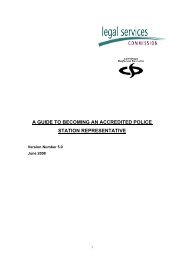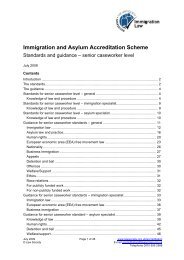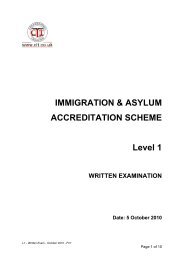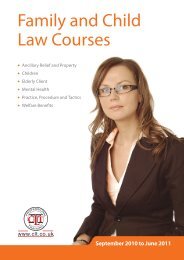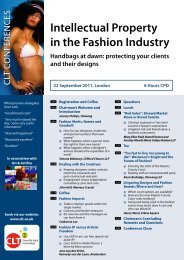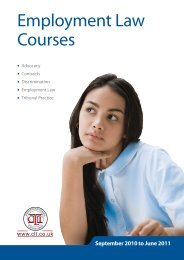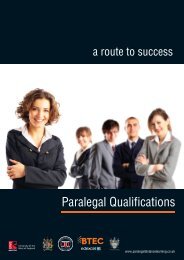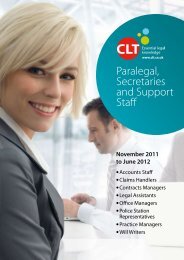Immigration – Reaccreditation Assessment Regulations and ... - Clt
Immigration – Reaccreditation Assessment Regulations and ... - Clt
Immigration – Reaccreditation Assessment Regulations and ... - Clt
You also want an ePaper? Increase the reach of your titles
YUMPU automatically turns print PDFs into web optimized ePapers that Google loves.
The Procedure for Dealing with Allegations of Cheating<br />
This code is CLT’s st<strong>and</strong>ard policy for all types of assessment<br />
1 Introduction<br />
Appendix A<br />
1.1 It is fundamentally important that c<strong>and</strong>idates are assessed fairly <strong>and</strong> on equal terms<br />
with each other for the same award. Any attempt by a c<strong>and</strong>idate to gain unfair<br />
advantage over another c<strong>and</strong>idate in the completion of assessment, or to assist<br />
someone else to gain an unfair advantage, is cheating.<br />
1.2 Alleged academic dishonesty, which threatens the integrity of CLT’s assessment<br />
procedures <strong>and</strong> the maintenance of its academic st<strong>and</strong>ards, is viewed as a serious<br />
offence <strong>and</strong> will be thoroughly investigated.<br />
1.3 Cheating is both an academic <strong>and</strong> a professional offence. Certain professional<br />
bodies place upon c<strong>and</strong>idates, registered for a programme to which they give<br />
professional recognition, an obligation to adhere to principles or st<strong>and</strong>ards of<br />
professional conduct. The <strong>Assessment</strong> Board will report a c<strong>and</strong>idate to the Solicitors<br />
Regulation Authority where it is of the opinion that the offence has a bearing on the<br />
c<strong>and</strong>idate’s character <strong>and</strong> suitability to be a solicitor or the employee of a solicitor.<br />
1.4 CLT will investigate all allegations of cheating in accordance with the procedure set<br />
out in this code <strong>and</strong> where the offence is admitted or proved will impose appropriate<br />
penalties.<br />
2. Definitions <strong>and</strong> Examples of Cheating<br />
2.1 A c<strong>and</strong>idate who obtains or attempts to obtain an advantage in an assessment<br />
through unfair or improper means is guilty of cheating.<br />
2.2 The following are indicative examples of cheating but the offence is not limited to the<br />
examples given below:<br />
(i) Copying, stealing, appropriation or use of the work of another<br />
(ii) Permitting or assisting another to copy, appropriate or use one’s own work<br />
(iii) Taking into an assessment any materials or aids other than permitted<br />
materials<br />
(iv) Consulting unauthorised material, in or outside the assessment room during<br />
an assessment<br />
(v) The use of an unauthorised dictionary<br />
(vi) The use of an unauthorised calculator<br />
(vii) The use of a mobile telephone during the assessment<br />
(viii) Being party to impersonation where another person sits an assessment in the<br />
place of the actual c<strong>and</strong>idate or a c<strong>and</strong>idate is knowingly impersonated by<br />
another<br />
(ix) Leaving the assessment venue to refer to concealed notes<br />
(x) The submission of a piece of work which has previously been assessed for a<br />
different award or assessment or at a different institution as if it were new<br />
work<br />
May 2011 <strong>–</strong> V14 23



